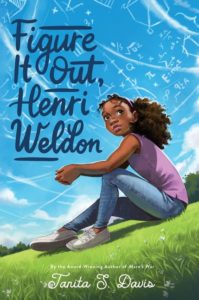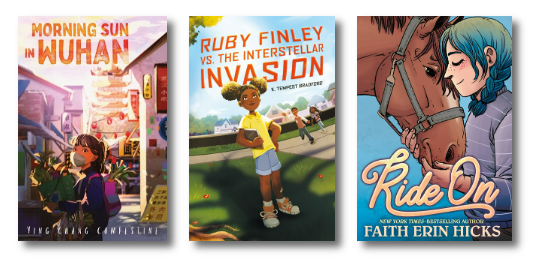
Tanita S. Davis is the award-winning author of eight novels for middle grade and young adult readers, including Partly Cloudy, Serena Says, Peas and Carrots, Happy Families, and Mare’s War, which was a Coretta Scott King Award Honor and earned her a nomination for the NAACP Image Award.
We talked with Tanita about her upcoming middle grade novel Figure It Out, Henri Weldon, representing learning disabilities in her writing, and encouraging all readers to look for their strengths.
 Figure It Out, Henri Weldon follows Henrietta Weldon, a seventh grader with dyscalculia, as she begins “mainstreaming” into public school—taking new classes, making new friends, joining the soccer team, and more. Where did the inspiration for this story come from?
Figure It Out, Henri Weldon follows Henrietta Weldon, a seventh grader with dyscalculia, as she begins “mainstreaming” into public school—taking new classes, making new friends, joining the soccer team, and more. Where did the inspiration for this story come from?
Back in the day, I followed a blog (which is sadly on indefinite hiatus) called Disability in Kidlit, which highlighted and discussed, from a disabled perspective, the portrayal of disability in middle grade and young adult literature. I ran across David Howard’s piece on dyscalculia and ADHD, and reflected on where his experiences and mine intersected. I hadn’t found much representation on dyscalculia in children’s fiction, and definitely not as much writing on girls with learning disabilities, even though it’s been normalized nowadays that everybody struggles with something sometimes. I wanted to dig into what it feels like when the world of numbers seems utterly closed to you – and yet, you’re still required to take those classes and pass them to succeed. “Figuring out” what else you are other than “not good at math” becomes supremely important.
While Henri’s learning disability makes math challenging, she is never reduced in the book to her dyscalculia. She faces her struggles with math while navigating the variety of challenges that come with growing up. How did you strike a balance that felt right for the character and the story you wanted to tell?
I wanted to weigh Henri’s struggles scholastically against the other struggles we have growing up – getting along with Difficult Sisters (!), finding our people, determining what makes us happy, and balancing greater responsibility. I wanted to touch on some of the things that came up culturally for her, as a young Black woman, while at the same time opening up her universal challenges that would appeal to any middle grader. No one is wholly one thing; even a junior high student who is scholastically brilliant isn’t only an Honor Roll kid. I hope I struck that balance strongly enough so that others will see themselves reflected, at least in part, in Henri’s story.
In the book, Henri realizes her love of writing and the power of poetry to express herself. When did you discover your own love of writing?
I participated in an Author’s Convention in the first grade. I still have a signed certificate from my teacher, praising the “publication” of my “book!” I was so very proud of myself that I worked on another several “books” after that. I began to seriously write “novels” for myself around the same age as Henri. They were of questionable plot and were transparently obvious characterizations of myself and my friends, but they were very entertaining. For me, I mean. I was far too shy to inflict them on anyone else!
Was there any part of the story, as you wrote it, that surprised you?
In initial drafts of the plot, the story was balanced between Henri and her older brother, whom she idolized. Later, as distance between their ages proved to be too great, I popped in a middle sister, just to give her someone with whom to share a bedroom, and boom – suddenly there was all of this conflict and angst. As the push-pull of her relationship with Katherine developed, LJ kind of faded back and did his own thing, and Henri developed into a person with a much, much stronger backbone, thanks to going several rounds with her sister every week.
What are you proudest of in the book?
I am honestly proudest of writing through my own feelings about my dyscalculia through the character of Henri’s mother. Many, many parents, adults, teachers, even, struggle with the idea that Education Is Vital and a sort of Oh, NO, disaster! attitude about learning disabilities. I lived through people feeling that if I just practiced more, if I just buckled down, if I just-just-just-just, and, you know, you start believing people’s hot takes yourself. I tried everything I was told, and I tried so hard to just “get over” my “conditioning” as a female (yep, someone told me it was just because I was a girl and was expected to be bad at math). But the truth is, our brains work the way they work. It is what it is, and it takes a deep wisdom and a fierce love to say, “you have other strengths, look for them,” especially when you weren’t raised hearing that. I hope that if readers’ parents and teachers and adults can’t say this to them, that they will say it to themselves. We have other strengths. Our brains don’t work with some concepts the same ways other people’s do, and that’s just fine. We’ll find our own way.
What is your favorite part about writing for younger readers?
What I love best about writing for younger readers is that they have their ideas in place about what they like in a book, but they’re not yet insistent on what a story has to have. It doesn’t have to have romance, though a touch of that is nice. It doesn’t have to have all loud things, though adventures and zany things are fun. It doesn’t have to be entirely one thing or another. I think the sense of openness and a “let’s see what you’ve got” attitude is why middle grade/junior high remains one of my favorite age groups.
Have you read anything recently that you really loved? Are there upcoming books that you are excited about?
Oh, this is a very dangerous question as I’m almost always reading and could go on and on… buuut, limiting myself to three: Ruby Finley vs. the Interstellar Invasion by K. Tempest Bradford was a hoot, just an excellent MG adventure. Faith Erin Hicks’ Ride On was thoughtful and heart-engaging in a wholly different way, and I loved the depictions of the many moods of the characters (it’s a graphic novel). Finally, Morning Sun in Wuhan by Ying Chang Compestine is one I’m looking forward to, which comes out this November. Many authors have agonized over whether or not to include any mention of the SARS-CoV-2 virus which has upended our lives in the last three years. This author decided to go all in and tell the story of a Wuhan community who came together in the worst of the fear and death and banded together to find normalcy and joy again.


